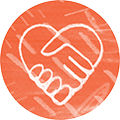
What works to end mental health stigma and discrimination?
 Spotlight on learning from local partner Moray Wellbeing Hub
Spotlight on learning from local partner Moray Wellbeing Hub
The content displayed on this page was produced by Moray Wellbeing Hub and describes their reflections, experiences and learning over the years about lived experience leadership in driving change in healthcare / mental health services.
Visit Moray Wellbeing HubHere we provide information about the big impact that mental health stigma and discrimination have on people, so you are able to recognise it and know how to challenge it.
“I just want it stopped.”
Moray workshop participant, 2024
We know that mental health stigma and discrimination has a big impact on people - so it’s important to be able to recognise it and know how to challenge it.
The three-pronged approach to challenging stigma – Social Contact, Education, Protest
Research has shown that taking action against mental health stigma and discrimination takes a three-pronged approach – using social contact, education and protest. Read more about the different elements at the end of this section.
Empowering peers - effective delivery of the three-pronged approach to stigma
As The Lancet Commission Report published in 2022 makes clear, people with living/lived experience are the key agents for influencing change in stigma. Social contact, education and protest can be maximised by creating opportunities and support in communities, services and sectors. These can focus on building skills, capacity and opportunity for people with lived experience to be trained as leaders, champions or influencers of change. This can give both sustainability to taking action but also positive impact for the individuals involved in improving their own wellbeing with CHIME (Connection, Hope, Identity, Meaning, Empowerment).
Peers can deliver targeted activity and interactions by embedding social contact, education, protest and lived experience. The credibility of this is powerful because it makes use of lived and living experience to both highlight the reality of stigma and discrimination directly experienced, but also reinforces recovery, by showcasing change through personal journeys as a peer.
For those interested in this activity, there are aspects to consider to ensure your own wellbeing is paramount alongside sustainability:
- Leadership: Recognising that leadership is something everyone can do; your voice will matter
- Peer support: Finding others and taking on their support to aid you, as well as offering this
- Accountability: Being clear about what you can and cannot do, avoiding over-committing, and whose voice you speak for
- Trauma based approach: Past experiences can have an impact on present-day functioning. Taking a trauma-informed approach and considering safety, trustworthiness, choice, collaboration, and empowerment, supports safety for everyone, especially you.
Social Movements - recovery focused mechanisms to challenge stigma
Social movements are a recognised form of catalysing change, bringing peers and supporters with a common interest or goal together, to use lived experience as part of a collective, with benefits such as shared resources and support. Their ability to continue to campaign to challenge mental health stigma, shifting attitudes and behaviours, and empowering those with lived experience whilst incorporating social contact as a key ingredient of interventions, is rapidly growing.
This collective approach can have large-scale impact. Evidence from National Lottery funded projects in 2020 backs up lived experience leading as a way to create effective system change.
Further reading and key resources
- The Lancet Commission on ending stigma and discrimination in mental health 2022
- Reducing Stigma, Emphasising Humanity: ALLIANCE Scotland 2022 report
- With Us, For Us: 2023 VOX Scotland and Scottish Recovery Network report exploring services and what needs to change from people with personality disorder diagnosis perspective
- ILEP Reducing healthcare stigma guidelines: 2011 guide.
National social movements
- See Us: anti-stigma
- United to Prevent Suicide
- Scottish Peer Support Network (link to follow)
- VoX, national collective advocacy in mental health
